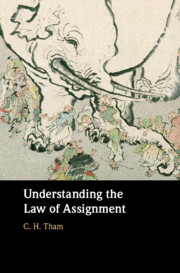
-
Select format
-
- Publisher:
- Cambridge University Press
- Publication date:
- October 2019
- October 2019
- ISBN:
- 9781108636674
- 9781108475280
- 9781009045247
- Dimensions:
- (228 x 152 mm)
- Weight & Pages:
- 0.94kg, 520 Pages
- Dimensions:
- (229 x 152 mm)
- Weight & Pages:
- 0.76kg, 522 Pages
- Subjects:
- Law, Contract Law, Property Law
You may already have access via personal or institutional login- Subjects:
- Law, Contract Law, Property Law
Book description
The practical importance of intangible personalty such as debt, bonds, equities, futures, derivatives and other financial instruments has never been greater than it is today. The same may be said of interests in intellectual property. Yet the assignment of these intangible assets from one to another remains difficult to understand. Assignments are often taken to operate as a form of transfer akin to conveyances of legal titles to tangible personalty. However, this conception does not accurately reflect the law of assignment as it has developed in the caselaw in England and Wales. This book sets out a different model of the workings of assignments as a matter of English law, one that provides an analytical, yet historically sensitive, framework which allows us to better understand how, and why, assignments work in the way the cases tell us they do.
Reviews
‘Chee Ho Tham has here produced a remarkably well-written, erudite and thoroughly informative work, and in addition a very distinct accretion to the scholarship on assignment. I recommend it without hesitation to commercial and obligations lawyers alike.’
Andrew Tettenborn Source: Lloyd's Maritime and Commercial Law Quarterly
Contents
Metrics
Altmetric attention score
Full text views
Full text views help Loading metrics...
Loading metrics...
* Views captured on Cambridge Core between #date#. This data will be updated every 24 hours.
Usage data cannot currently be displayed.
Accessibility standard: Unknown
Why this information is here
This section outlines the accessibility features of this content - including support for screen readers, full keyboard navigation and high-contrast display options. This may not be relevant for you.
Accessibility Information
Accessibility compliance for the PDF of this book is currently unknown and may be updated in the future.


